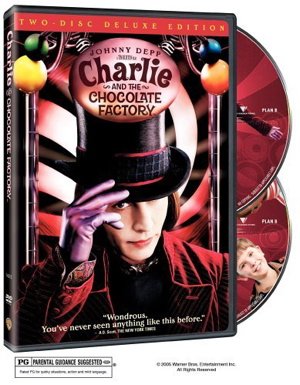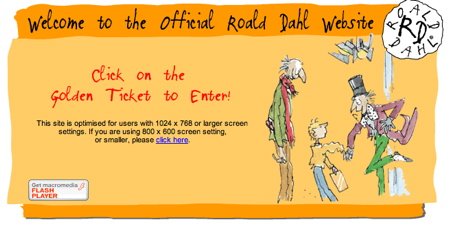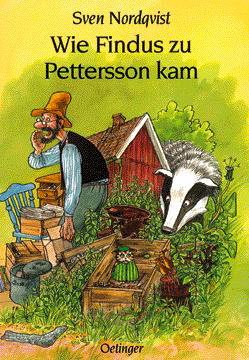
Charlie and the Chocolate Factory
Today I finally got around to watching Charlie and Chocolate Factory. I was never exposed to the original book as a kid, so I approached the whole thing with a curious, open mind. The DVD of the movie I watched with my kids was NOT a crappy pirated one, but a 2 disk “deluxe edition” original that I recently bought. I found the movie very entertaining I liked the story line and concept a lot. The kids liked it too. Being a remake of the 1971 movie Willy Wonka and the Chocolate Factory, some people apparently were concerned that this Tim Burton (starring Johnny Depp) version would not do justice to the original book or the first movie. As I have neither read the book nor seenthe first movie I can’t comment on that..
But boy am I glad I have the 2 disk edition. On disk 2, which contained some really good ‘making of’ documentaries, I found a short BBC produced documentary on Roald Dahl (1916-1990), the writer of the book upon which the film is based and, as I learned, one of the most important and productive writer’s of children books in the 20th century. The documentary includes older interviews with Dahl himself, his widow, his children and his various collaborators. In that, it provides an amazing portrait of a really amazing, creative man.

It came as no surprise to me when I learned that Dahl hails from a Scandinavian origin. He was born in and grew up in Wales. But both his parent were Norwegian. You can count on the Scandinavians to deliver great children stories. In countries with long, bitter cold winters that lock kids into wooden cabins, how would families cope (in the days before TeeVee)? Well, by coming up with great children stories!
In his biography, published on the official (and excellent) Roald Dahl web site, it is recounted how his Norwegian mother was a great teller of Nordic tales, a talent that obviously Roald inherited.
A common feature that you’ll find in the writing of Nordic children authors is a sense that they write from a child’s point of view, often with a sense of mischievousness and devilish twists. Dahl himself saw himself as a child and allied himself with children against the boring world of adults.
In one of his books, the main character tells the children reading it:
‘When you grow up and have children of your own, do please remember something important: a stodgy parent is no fun at all. What a child wants and deserves is a parent who is sparky.’
(note to self: be a sparky parent, not a stodgy one)
I can’t help but contrast this attitude to that of the mass of decidedly stodgy Arab children literature, which is often preoccupied with shoving adult ‘righteousness’ and ‘national values’ down the throats of the young or taking them on historicist trip that simply glorify the past.

If you are interested in Arabic translations of great Swedish children books try to check out your local book store for the publication of Dar Al-Muna. Started by Mona Henning over a decade ago this publishing house has put a great effort into bringing writers like Astrid Lingren, Gunilla Bergström, Sven Nordqvist and others.
In a recent quote in Al Ahram Weekly, Henning, who won the Sharjah International Book Fair (SIBF) special award was obviously concerned about the state of Arab children’s book publishing:
At the stall of Dar Al-Muna, which publishes high quality literary children’s books translated from Swedish to Arabic, parents and children were browsing the books avidly, but seemed reluctant to make purchases. Mona Henning, the publisher who received the SIBF’s special prize this year, complains that the Arab writing for children is still in its early stages, which badly reflects on the sales of her books. “People think that my books are expensive. But the fact is that the content of the cheaper books they buy is shallow. Unfortunately, religious and educational books for children are usually the ones that sell most.”
Sadly I did not find a website for Dar Al-Muna. But after some Googling around I found the following contact info:
Al-Muna, Box 127, 182 05 Djursholm, Sweden
tel 08-21 05 65, 755 65 73, fax 08-622 61 51, mona.henning(at)swipnet.se

Comments
3 responses to “From the Chocolate Factory to Scandinavian Children Literature”
I’m glad to see that you have discovered Roald Dahl and Tim Burton. Dahl has long been one of my favorite authors. His stories are unlike many childrens stories. They are not sappy and all positive. They often have a decidedly dark streak. The adults are often rather villianous. Tim Burton is also one of my favorite directors. His visual sense is unique and I think is ideal for the world of Roald Dahl. I’ve read Charlie and the Chocolate Factory to my son, and seen both movies. I loved Gene Wilder’s version but I think the new Burton version is better and it is definitely truer to the book. I have seen all of Tim Burton’s films and love most of them. I highly recommend, Edward Scissorhands, Big Fish, the original Batman, Beetlejuice, The nightmare Before Christmas, and The Corpse Bride. Definitely skip Mars Attacks and Planet of the Apes, nobody is perfect.
If you like Roald Dahl, check out Matilda, the BFG, and The Witches. The film of Matilda is also worth watching.
“The DVD of the movie I watched with my kids was NOT a crappy pirated one”
Pirated copies aren’t crappy!
As for the movie, I got my self a “pirated” copy of the film as I am a big Johnny Depp fan! but I was completely turned off by the whole thing. The pace was so slow I was almost asleep, and I kept waiting for the magical moments to happen. Alas, they never did. The opening went on for ever and a day – remember the wonderful entrance Gene Wilder makes in the original? Well, Willy Wonka’s entrance here, with the stupid “song” of the puppets, was just dire. He actually looked embarrassed to be there. The parents of the “lucky winners” were one-dimensional to say the least, and although the child actors were OK they were nothing to write home about. My 11 year old son went with me to see this film, and as we came out of the theatre I was wondering what he would have to say about it (and whether I would have to pretend that I had liked it!) but the first thing he said was, “Well, that’s not the best film I’ve ever see. Bit of a disappointment really.” I just felt that the director had wasted so many opportunities, not to try to emulate the first film, but to bring some fresh magic to the wonderful story. Instead, all we got was long-drawn out scenes, bad dialogue and a faintly embarrassed Johnny Depp.
Hallo,
you might be interested in my website on Arabic children’s literature:
http://www.petra-duenges.de/
All the best
Petra Dünges